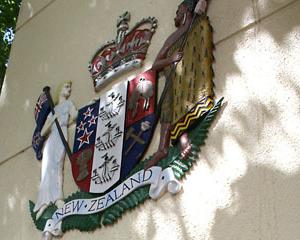Antonie Dixon has told so many stories since the evening he attacked two women with a samurai sword and fatally shot a man that he is struggling to keep track of all his lies, the Crown told the High Court at Auckland today.
Crown prosecutor Simon Moore today challenged evidence Dixon gave yesterday, including that God had commanded him to decapitate the women, that he saw snipers at the back of an ambulance and he saw a man with horns.
Dixon's biblical visions were a recent and convenient fabrication to cover his actions, and he had failed to mention them to police after his arrest, Mr Moore said.
He also challenged Dixon over evidence he killed out of self-defence, saying instead of being frightened as he claimed, Dixon boasted to police and was pleased with the killing.
Dixon, 40, faces eight charges relating to incidents that occurred in January 2003 when Renee Gunbie and Simonne Butler were attacked with a samurai sword at Pipiroa near Thames and James Te Aute was shot dead in Auckland.
Dixon was found guilty in 2005 of eight charges, including murder and causing grievous bodily harm, but the Court of Appeal later ordered a second trial, suppressing its reasons for quashing the first trial.
Mr Moore often interrupted Dixon, asking him to answer the questions as he gave rambling accounts of his actions.
"The problem is you're making so much up, Mr Dixon, you're having trouble remembering what you've told people about this attack."
Dixon replied it was 5-1/2 years ago and it was difficult to remember.
"You're having trouble remembering, Mr Dixon, because you've told so many different stories about the attack that it was impossible to keep up."
Mr Moore challenged Dixon, saying if God was responsible for the attack and shooting, why had he not told one of the 11 people he spoke with shortly after he was arrested.
Dixon replied he had never given evidence in a trial before and was telling Mr Moore what he could remember.
"You're able to remember some details I put to you, Mr Dixon, with remarkable clarity but there are some questions I put to you which pose a problem because you're lying."
Dixon said his mind was overloading like a computer and it was hard to keep track of everything.
Mr Moore asked why, in police negotiation tapes, Dixon was prepared to say he was the "chosen one", but "nowhere do you say God directed you to kill the women".
"What is to stop you telling all these people why you did this?"
Mr Moore also questioned why Dixon had not mentioned the ambulance with the snipers until during his first trial in 2005.
Dixon said it was because he did not have to tell anyone, and it wasn't important.
Mr Moore said Dixon was boastful and pleased when he was talking to police about shooting Mr Te Aute, telling police "good job" when he was told he had died.
"Why were you so interested in the number of bullets you got into him?"
Dixon replied he did not know and said Mr Moore was trying to make sense of something which even he could not understand.
Dixon maintained he thought Mr Te Aute was armed and was concealing a weapon but, in fact, it was a P-pipe.
Mr Moore said Dixon was creating a story which fitted in around evidence disclosed to defence lawyers at the first trial.
"You're just adding things, aren't you? Bit by bit." Mr Moore said.
Mr Moore continues his cross-examination tomorrow.











